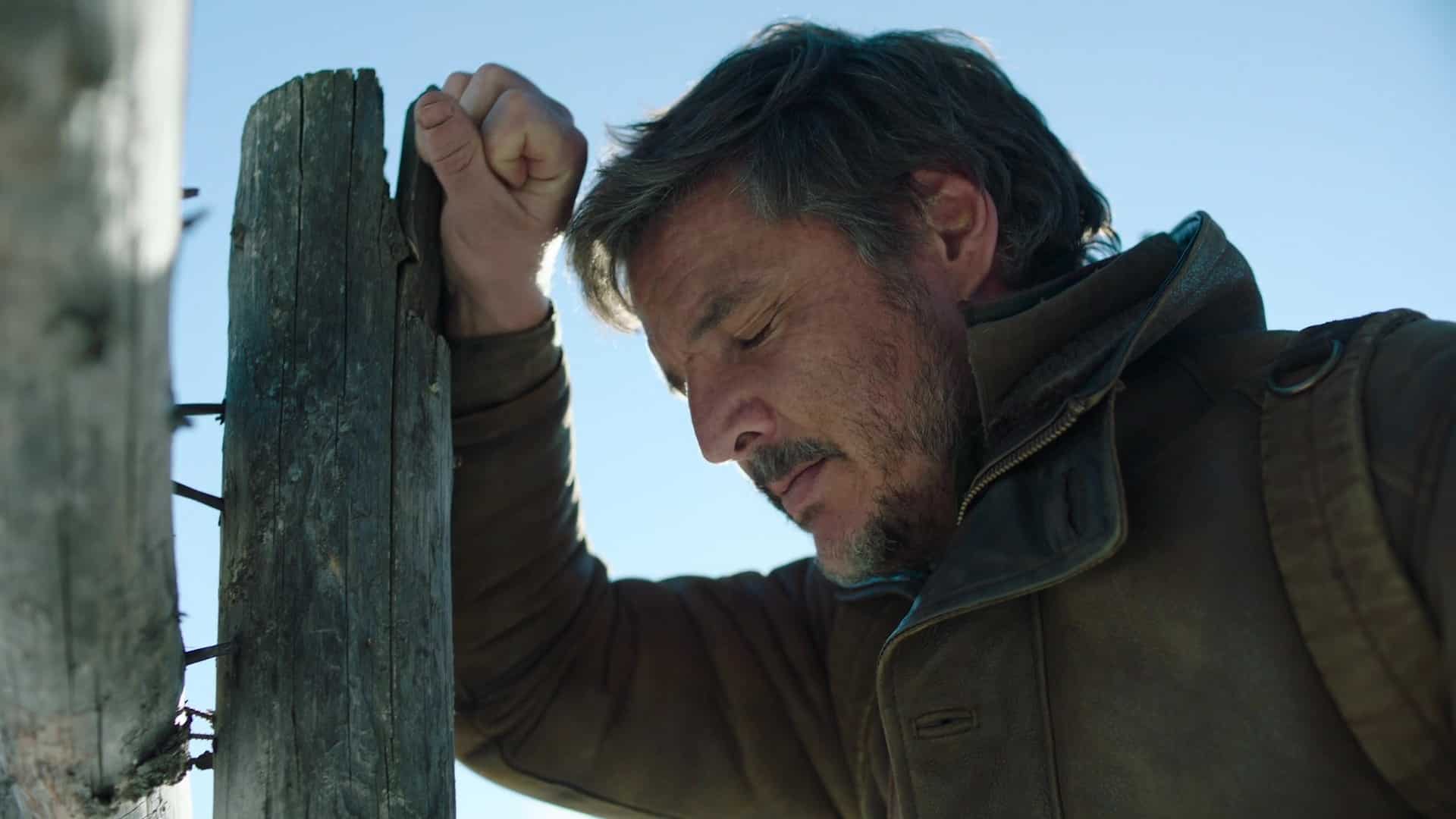Episode 6 of The Last of Us HBO sees a few major emotional crossroads take place, as Joel (Pedro Pascal) finally reunites with his brother Tommy (Gabriel Luna) in his new hometown of Jackson. Further scenes between Joel and Ellie (Bella Ramsey) provide further insight into their growing dynamic, and we’re also introduced to Tommy’s wife and Jackson’s town leader Maria (Rutina Wesley).
In this recap of HBO’s The Last of Us Podcast Episode 6, we’ll dive into some of the key themes and inspirations for this episode, as discussed by Showrunners Craig Mazin (Chernobyl), Neil Druckmann (Creative Director on The Last of Us Part I & II), and host of the podcast Troy Baker (Joel’s original voice and motion capture actor on The Last of Us Part I & II), as well as compare and contrast the HBO adaptation to the base games.
HBO’s The Last of Us Podcast – Episode 6 Recap – ‘Kin’
- How trauma manifests in Joel
- Inspirations and improvisations from the first game
- Exploring the town of Jackson
- Ellie and Maria’s relationship
- The meaning behind the music in Episode 6
- Additional analysis and notable quotes
How trauma manifests in Joel
Episode 6 takes place three months after the conclusion of Episode 5 – in which Henry (Lamar Johnson) tragically shoots his brother Sam (Keivonn Woodard) after he succumbs to infection overnight.
The team wanted to acknowledge and honour their memory early on in the episode, while also giving the audience an understanding that Joel (Pedro Pascal) and Ellie (Bella Ramsey) weren’t in ‘direct mourning’ or feeling ‘immediate grief’ as a result of the time passing.
When discussing the introduction of Marlon (Graham Greene) and Florence (Elaine Miles) – a couple Joel and Ellie meet during their search for Tommy – it’s mentioned that while these were two people who ultimately survived by isolating themselves, it was a side arc that didn’t reflect so much ‘doom and gloom.’ Druckmann added:
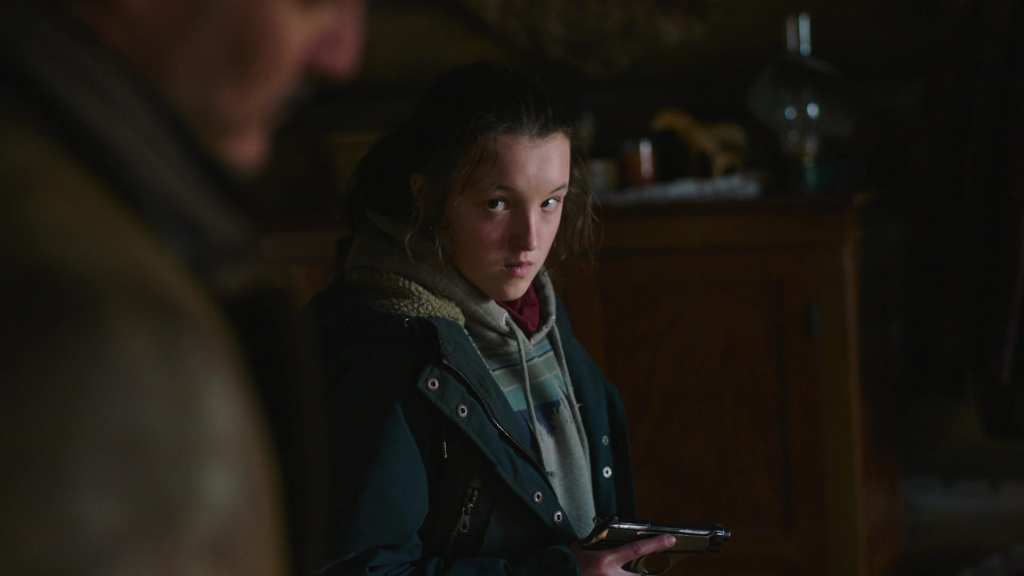
‘We would talk a lot about not exhausting our audience, and we just traumatised them with the end of [Episode 5]. So this was a moment of levity, a moment to show how Joel and Ellie have progressed in their relationship. They’re much more comfortable with each other.’
Druckmann added that the camera would be placed quite far back during gameplay sequences in The Last of Us, and didn’t allow for the player to see Joel and Ellie’s facial expressions. These moments were often replaced with lines of dialogue to compensate. In the series, however, they were able to catch more subtle reactions by filming the actors’ faces more intimately, which more effectively communicated the trajectory of their relationship.
Druckmann mentioned the team had discussed how Sam and Henry’s death directly impacted Joel, which led to conversations surrounding Joel’s panic attacks, and how they manifested throughout Episode 6.
Mazin elaborated, saying that people who hold a ‘core shame’ over past traumas will often discount the things they have done well – referencing how Joel ‘dwells’ on and defines himself by the times he has failed Ellie, and disregards every instance he has protected her thus far.
He noted that underlying threads of failure were often seeded throughout peaceful and happy moments, referencing the scene where Joel falls asleep through both night watches after he and Ellie shared a calm interaction talking about space. Mazin said that as Ellie ends up becoming the caretaker here, it reinforced a ‘growing panic’ in Joel that he was ‘insufficient’, and wouldn’t be able to keep her alive.
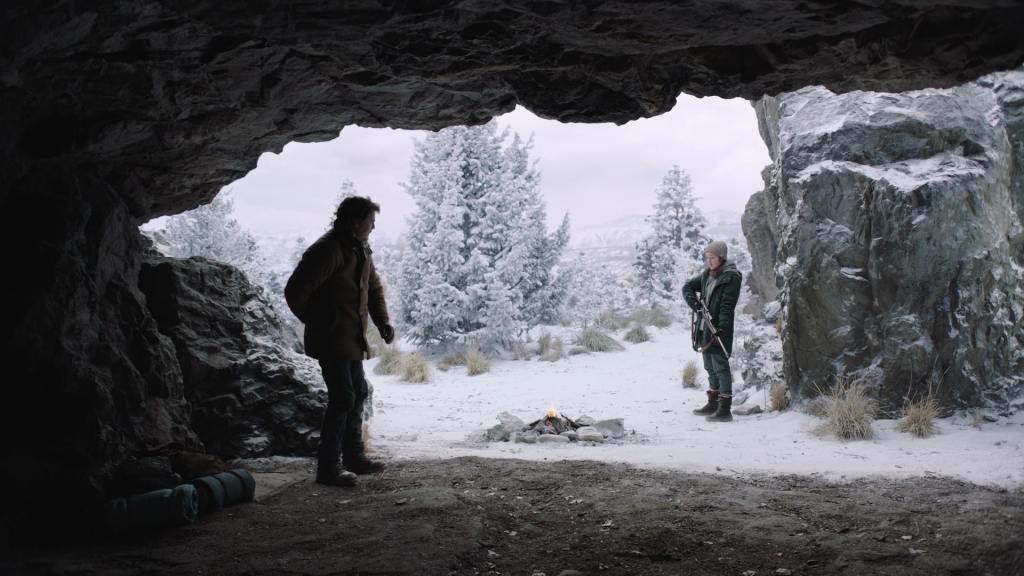
The team said these scenes spoke to Joel not comprehending why these ‘failures’ affected him so strongly, and that the pair weren’t verbalising the amount of care they so clearly had for each other. Mazin added in reference to how Joel internalises his feelings, that any reminders of past tragedies will be magnified ‘in your mind and your heart until it threatens to subsume you.’
Mazin also said: ‘Panic attacks feel very much like heart attacks. It’s your body telling you you’re in terrible danger but you don’t understand yet why… So much of what this episode is about is Joel coming to terms with how terrified he is suddenly – that [Ellie is] going to die and it’s going to be his fault.’
Inspirations and improvisations from the first game
The team also spoke to a few inspirations and moments of improvisation from the first game that influenced the course of direction for the adaptation.
Mazin had commenced work on the HBO adaptation of The Last of Us with Druckmann well before The Last of Us Part II had launched, and mentioned Druckmann had shown him a sequence from the game early on which touched on Ellie’s love and fascination for space exploration.
Mazin noted after seeing this that it was a great opportunity for the series, as they had more knowledge to incorporate. When speaking on the moment Joel finishes Ellie’s sentence in the series by immediately knowing her favourite astronaut is Sally Ride, Mazin said it was a moment where Joel is ‘instinctively… already in [Ellie’s] head. He knows this kid.’
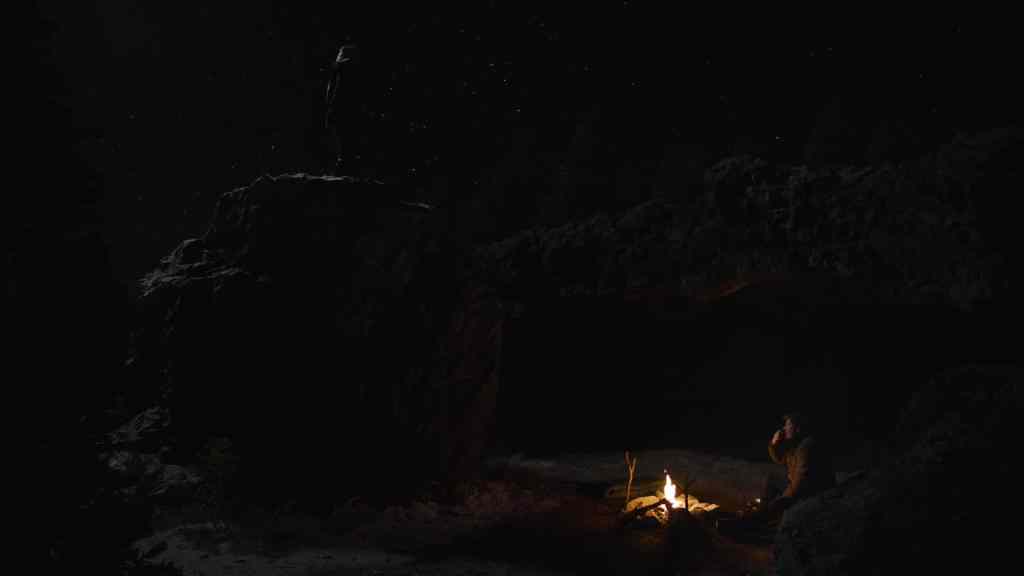
Druckmann also noted that the main inspiration behind Ellie’s interest in space stemmed from Ashley Johnson’s own personal love for the subject (Ellie’s original voice and motion capture actress in The Last of Us Part I & II).
He stated that these projects are ‘massive collaborations’ and after discovering this fact said, ‘I want to make Ellie even more like Ashley.’ This sentiment also carried over for Troy Baker (Joel’s original voice and motion capture actor in The Last of Us Part I & II), as Druckmann stated Baker’s own musical abilities influenced Joel’s guitar playing, and his aspirations of wanting to become a singer before the outbreak occurred.
Mazin also spoke to an emotionally impactful scene between Joel and Ellie – in which Ellie confronts him after discovering he planned to abandon her in Jackson and leave her in Tommy’s care. Mazin said he wanted this scene to be as close to what was depicted in the game as possible, ‘with rare exceptions’, noting the removal of Joel’s original ‘mighty thin ice’ line in the first game. Druckmann added that as Joel’s dialect is slightly different in the series, this line would have stood out in a way that would have detracted from the adaptations’ version of the scene.
This scene in the first game also included improvisations from Ashley Johnson which inadvertently elevated the moment. The team had filmed multiple takes before having to take a long break, and there was a lot of frustration in the air as they weren’t able to hit the emotional climaxes the scene demanded. After returning and filming another take, Johnson had improvised Ellie’s shove, as well as the line ‘fucking except for you.’
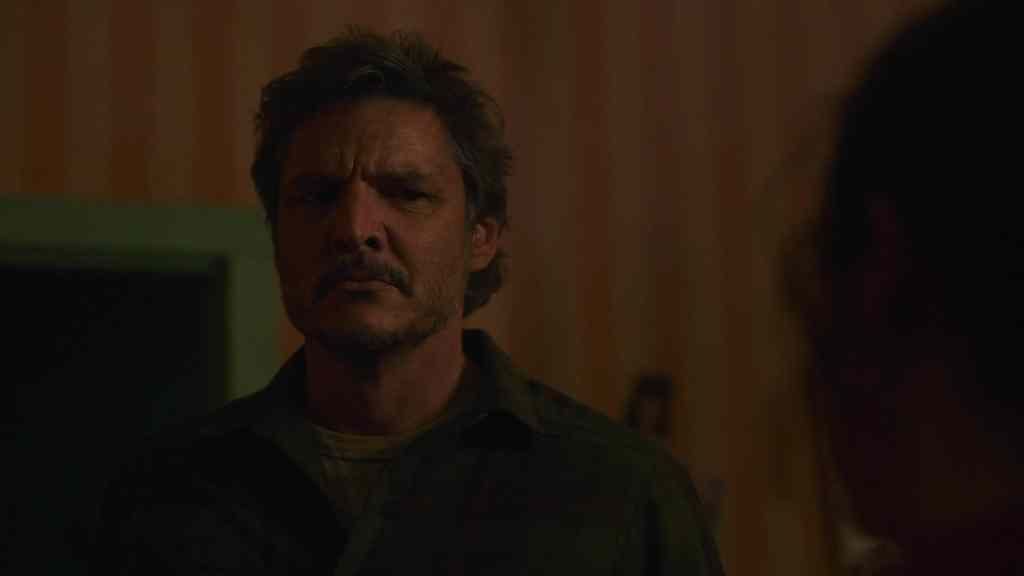
Mazin said: ‘What I love about that is the imperfection of it. That’s not where the word ‘fucking’ belongs normally, syntactically, which shows you that Ashley was just in the moment, because we are not perfect when we speak.’
‘You would never write it like that, but it’s perfect the way it is. So that was perfectly replicable and it was important to me that we [included it in the series].’
One of the main differences presented was changing how Joel was injured towards the end of the episode – as in the adaptation, Joel is stabbed by a broken baseball bat as opposed to impaled after falling off a second-story balcony. Mazin said the original version of the injury made sense tonally, but as the series dealt with a more ‘grounded’ approach to how violence impacts the body, the stab wound would have been just as serious despite its simplicity.
Mazin also noted Pedro Pascal had directly improvised a line in the series during the scene where Joel is opening up to Tommy about recurring dreams, saying ‘I don’t know. All I know is that when I wake up I know I’ve lost something.’ Mazin said:
‘That notion that when you wake up you just have a feeling that you’ve lost something is so beautiful and it’s so confessional, and this is not at all like something we saw from Joel in the game. This is different, this is, this is sadder, I think. It’s a little more broken down and it’s a little more upsetting.’
Exploring the town of Jackson
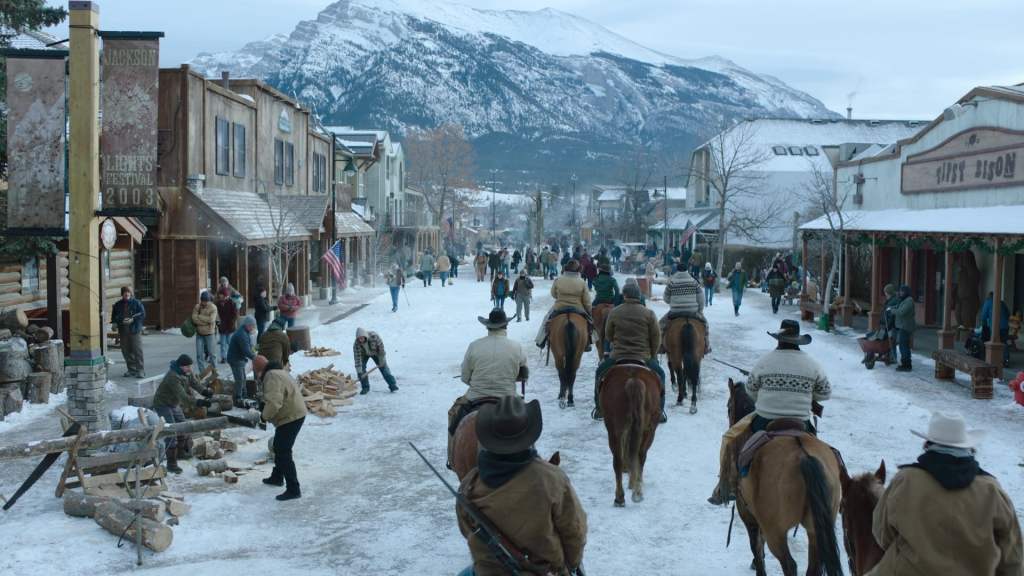
Tommy and Maria’s home base of Jackson is revealed in Episode 6, which shows a series of storefronts, entertainment precincts, and fully functional greenhouses and farmlands. It is, by all accounts in this world, about the closest thing to normality Joel and Ellie have encountered on their journey so far.
Druckmann mentioned that during the development of The Last of Us, the majority of Jackson is shown in the dam – as Joel and Ellie are assisting Tommy and Maria in fixing it. The team at Naughty Dog had drafted concept art for the interiors and wider areas of the town, but were unable to gather the resources to pull it off, mostly due to timing and budget constraints. Jackson is, however, shown in much greater detail in The Last of Us Part II.
Druckmann said that by including these more intimate depictions of the town in the HBO adaptation, it sent a much more interesting message of showing what was at stake for Joel and Ellie. He added that it was a place where the two could eventually ‘settle down and actually live a semi-normal life.’
Mazin also mentioned that this episode was directed by Bosnian filmmaker Jasmilla Zbanic (Quo Vadis, Aida?), and that Zbanic had grown up in Bosnia’s capital city Sarajevo in the midst of war. When the team approached her to direct two episodes that took place in ‘war-torn Kansas City’, they mentioned her personal experience with the subject matter would make her an ideal candidate to spearhead the episodes.
Zbanic declined work on these episodes, saying that directing Episode 6 was much more appealing, as she was interested in ‘showing a society that actually functioned.’ Mazin added that Zbanic highlighted this theme really well, noting that Maria (Rutina Wesley) – the appointed leader of this town – spoke to the notion of presenting ‘a better way of survival’ that didn’t revolve around violence.
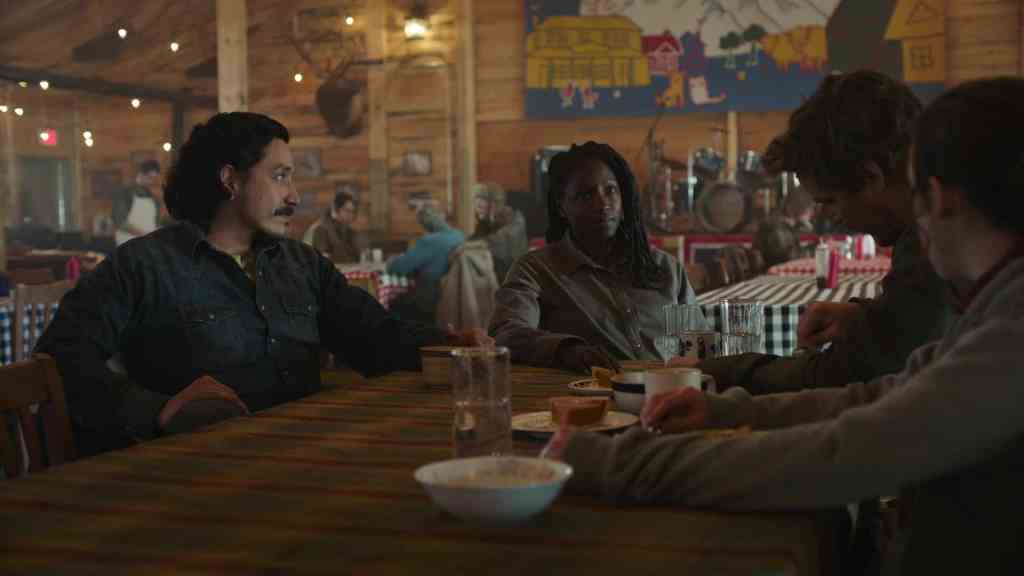
Mazin also noted that the movie playing on the projector during one of the towns’ movie nights was The Goodbye Girl – a film that resonated with him as a child, in part due to the parental nature of the relationship between co-stars Richard Dreyfuss and Quinn Cummings.
Mazin added: ‘I liked the idea of movies as an additional signifier of how civilised this place was. Because up until this point, the world revolves around ammunition, guns… food, batteries, transportation, and the only other person that was invested in art was Frank.’
‘I liked the idea that one of the signifiers that this town is functioning is that it is still interested in art.’
Druckmann also took inspiration from the film Road to Perdition whilst developing the first game, as it focuses on a Father doing all he can to keep his son guarded against a world corrupted by violence. As Joel is a father figure to Ellie, Druckmann said he wanted the themes of protecting a child to centre on them learning to use violence as a tool in order to keep them safe, as opposed to hiding them from it.
Ellie and Maria’s relationship
Mazin spoke to the scenes that played out between Ellie and Maria, saying that: ‘There was something that we wanted to take advantage of which was the idea that for a moment here we could see Ellie with a maternal figure again. We had seen it briefly with Tess, and now we’re with Maria.’
He added that Maria expressed this quality through supplying Ellie with clothing, a shower, and feminine hygiene products, adding that these interactions also connected to themes surrounding sisterhood and womanhood.
Mazin added: ‘Half of our planet is women, [post-apocalyptic shows] never talk about menstruation – which is a huge thing you’re going to have to deal with in the apocalypse – this is the second time we’ve come around on it. Joel has no interest in helping out on that front, but here Maria’s been thinking about it already.’

Mazin also spoke to the intelligence both characters possess, adding that the two both express this trait verbally as opposed to Joel who is more stoic in nature. Mazin spoke to Wesley and Ramsey whilst filming the haircut scene, referring to this moment as a ‘fist fight’ between the pair, only without any punches being thrown. He noted that at this moment Ellie is being challenged on her opinions of Joel, ‘by someone that’s as smart as she is.’
Druckmann also spoke to temptations the team had to include more action sequences in this episode, as opposed to more emotionally heavy scenes. Ultimately, he thought this moment counted as its own action sequence that communicated Ellie’s loyalty to Joel, and was ‘as captivating as the cul-de-sac beat in [Episode 5].’
The meaning behind the music in Episode 6
The team also praised the score from The Last of Us, with Baker referencing ‘All Gone’ by both games’ and series’ composer Gustavo Santaollala. Baker mentioned this specific composition always brings memories of Joel’s daughter Sarah to the surface, and Druckmann added:
‘I think beautiful scores, and scores that are used well… it’s a way into the subconscious… it’s a way to trigger memories or feelings without being explicit about it.’
Druckmann mentioned this song was played to ‘hark back’ to Sarah’s death. As it plays during the moment Joel catches sight of a woman in Jackson, who at first glance marks an eerily similar resemblance to Sarah, Mazin added:
‘I understand Joel in this moment. I’m not watching somebody feel something, I’m feeling something with them because I get it.’
Mazin also alluded to the return of ‘Never Let Me Down Again’ by Depeche Mode in an earlier episode of the podcast, and this song made its reappearance in the end credits of Episode 6. Mazin revealed that this slower, more haunting rendition of this song was covered by his own daughter, and singer Jessica Mazin.
He wanted for the themes of the song to be revisited, only this time centred on Ellie’s disappointment towards Joel as she looked down at him feeling he had ‘let her down.’ He stated this version of the song was to be re-presented from the point of view of ‘sadness and loss’, and it was also important to hear a female voice singing in order to ‘echo Ellie.’
Mazin also added: ‘Jessie is my daughter, and I think of Bella [Ramsey] as kind of an adopted daughter. It’s this gorgeous moment for me personally where it’s like my two daughters are together in this moment at the end of the episode.’
Additional analysis and notable quotes
- Druckmann refers to the line Joel says to Ellie in Episode 6 – ‘you deserve a choice’ – saying ‘that line specifically is very interesting to where the story goes.’ Mazin also added that the notion of choice will ‘echo back’ later on in the series. This is a personal, loose theory, but this is likely alluding to the somewhat ambiguous ending of the first game. We may see Ellie gain a little more control and assert her opinions over how the Fireflies intend to utilise her immunity.
- Craig Mazin – ‘When you end an episode with a tragedy – the way Episode 5 ends – the most important thing is that you let the audience know that you’re aware of it and you’re gonna honour it.’
- Neil Druckmann – ‘[Joel is] convincing himself that what’s best for Ellie is to let her go, and it’s really to protect himself.’
- Craig Mazin – ‘I think the honest truth is that if [Joel] could do anything or be anything, he would be a Dad raising his daughter. Whether it’s Sarah or – he can’t quite get there yet to say it’s Ellie – but, that’s what he was put on the earth to do.’
- Craig Mazin – (Referencing the moment Maria is cutting Ellie’s hair) ‘There was something that we wanted to take advantage of which was the idea that for a moment here we could see Ellie with a maternal figure again. We had seen it briefly with Tess, and now we’re with Maria.’
- Craig Mazin – (Referencing the movie night in Jackson) ‘I liked the idea of movies as an additional signifier of how civilised this place was. Because up until this point the world revolves around ammunition, guns… food, batteries, transportation, and the only other person that was invested in art was Frank… I liked the idea that one of the signifiers that this town is functioning is that it is still interested in art.’
- Craig Mazin – ‘If you qualify emotional action as being as impactful as physical action, this is one of our most action-packed episodes. Because a lot of emotional crossroads meet here… To me, that’s as exciting to watch – and certainly as exciting to write – as action.’
For further analysis and reading on the HBO adaptation of The Last of Us, you can check out the following articles:
- A spoiler-free review of the entire first season of The Last of Us HBO TV series
- The Last of Us HBO TV series: Cast and Character Guide
- The Last of Us interview: Henry and Perry actors examine their work
- The Last of Us interview – Storm Reid on portraying Riley
Episode recaps and analysis:
- The Last of Us – Episode 1 Recap – ‘When You’re Lost in the Darkness’
- The Last of Us – Episode 2 Recap – ‘Infected’
- The Last of Us – Episode 3 Recap – ‘Long, Long Time’
- The Last of Us – Episode 4 Recap – ‘Please Hold to My Hand’
- The Last of Us – Episode 5 Recap – ‘Endure and Survive’
- The Last of Us – Episode 6 Recap – ‘Kin’
- The Last of Us – Episode 7 Recap – ‘Left Behind’
- The Last of Us – Episode 8 Recap – ‘When We Are in Need’
- The Last of Us – Episode 9 Finale Recap – ‘Look for the Light’
Behind-the-scenes podcast recaps:
- The Last of Us Podcast – Behind the Scenes of Episode 1 – ‘When You’re Lost in the Darkness’
- The Last of Us Podcast – Behind the Scenes of Episode 2 – ‘Infected’
- The Last of Us Podcast – Behind the Scenes of Episode 3 – ‘Long, Long Time’
- The Last of Us Podcast – Behind the Scenes of Episode 4 – ‘Please Hold to My Hand’
- The Last of Us Podcast – Behind the Scenes of Episode 5 – ‘Endure and Survive’
- The Last of Us Podcast – Behind the Scenes of Episode 6 – ‘Kin’
- The Last of Us Podcast – Behind the Scenes of Episode 7 – ‘Left Behind’
- The Last of Us Podcast – Behind the Scenes of Episode 8 – ‘When We Are In Need’
- The Last of Us Podcast – Behind the Scenes of Episode 9 – ‘Look for the Light’
The Last of Us is now streaming on HBO Max in the US, and Binge in Australia.
